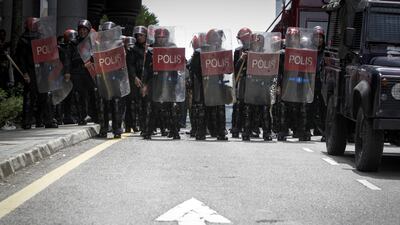Throughout the world, governments are responding to the threat posed by ISIL by passing new antiterrorism legislation. Last week, Malaysia’s parliament voted in favour of a Prevention of Terrorism Act. In March, France’s prime minister Manuel Valls unveiled a draft antiterror law. Canada’s senate is currently studying similar proposals, while increased measures were also announced in Britain by the Conservative home secretary, Theresa May ahead of the general election.
In each case, civil libertarians have been up in arms over the increased powers that would be given to the state, whether to allow detention without charge, increased surveillance of phone and internet data, extend the jurisdiction of security forces, or to clamp down on extremist speech on university campuses.
My sympathies would, in the past, have been squarely with the civil liberties campaigners. In Britain in particular, there is such a strong tradition of firmly resisting encroachment by authorities of any stripe that there was a huge public backlash when the previous Labour government began moves to introduce identity cards.
Most countries take these for granted. In the UK, however, many felt that it should not be incumbent on any individual to have to carry around a card proving who he or she was.
But the nature of terrorism and the interconnected, high-speed world we live in now, changes everything. Governments and security agencies need to be able to act very quickly. They do not always have the time that adherence to current processes require.
Those processes are supposed to protect us; nowadays, they may cost lives. The two men who murdered a British soldier, Lee Rigby in 2013 for instance, had boasted of their intentions online, but none of the sites that hosted them reported this. Had MI5’s request to use “intrusive” spying techniques on one of the men not taken so long to reach the British Home Office, it is also possible that the attack could have been prevented.
None of us like the idea of being spied on by government agencies, of course. But that horse has already left the stable. Privacy is dead. Just think of all the things we agree to let companies know about us when we sign up for mobile applications.
Nearly all seem to demand access to photos, contacts, location – information that frequently does not appear to be in the least bit germane to the app’s function. Why on earth do you need to see my photos? But if you want to have that taxi service on your phone, or update that free books library, there appears to be no choice. So most of us just shrug and sign up anyway.
If we allow companies this kind of access without really thinking about it, perhaps on the grounds that it’s best not to, why should governments not be allowed to look up this information in a truly urgent cause – the prevention of terrorism?
Yes, the use of any increased powers needs to be scrutinised very carefully. Allowing detention without charge must not lead to abuses of power, such as endless incarceration in Guantanamo Bay or authoritarian regimes making excuses to lock up opponents indefinitely. Neither should information about citizens ever be used for commercial purposes or passed on to other agencies not connected to monitoring terrorism.
But imagine if you had a close friend or relative killed in 9/11, 7/7, the Madrid or Bali bombings, or any of the other outrages perpetrated by nihilistic fanatics that have so far marred this century. If detaining someone without charge for a few days or months could have prevented any of those, would that not have been worth it?
These attacks can happen anywhere and anytime. The old methods of patiently infiltrating an organisation such as the IRA aren’t equal to the task, not when individuals like the Boston marathon bombers self-radicalised with little or no reference to any formal organisation. We simply do not have the time. If that sounds rather brutal, it is worth remembering that the long-term enjoyment of civil liberties is best protected by ensuring that societies are as free as possible from the risk of terrorist attacks.
To return to Malaysia’s new act: many would-be ISIL recruits have been trying to use the country as a transit point to the Middle East and the authorities have done well in identifying and stopping them.
But the threat of an attempted attack in Malaysia is undoubtedly real with the recent arrest of 17 suspected of plotting terrorist acts in the capital, Kuala Lumpur. This week, the deputy defence minister revealed that 70 people, including army personnel, had been discovered to have links to ISIL.
It is not as though violent extremism is unknown in the region. Abu Sayyaf in the Philippines has declared solidarity with ISIL. Jemaah Islamiyah in Indonesia is linked with Al Qaeda. And sufficient numbers of South-east Asians have joined ISIL in Iraq and Syria to have formed their own Malay Archipelago unit. Does anyone believe they intend to return to law-abiding lives should they come home?
From my apartment on the southern edge of Kuala Lumpur, I have a fine view of the city’s iconic Petronas Twin Towers. If a small diminution in the freedom of terror suspects is the price of our not waking up to the sight of those glorious skyscrapers smouldering, it is one well worth paying.
Sholto Byrnes is a senior fellow at the Institute of Strategic and International Studies, Malaysia


